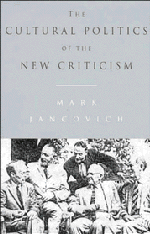Book contents
- Frontmatter
- Contents
- Preface
- List of abbreviations
- Part I The New Criticism and its critics
- 1 Contemporary responses to the New Criticism
- 2 The historical context of the New Criticism
- 3 Before the New Criticism
- Conclusion
- Part II The formation of the New Criticism
- Part III The establishment of the New Criticism
- Part IV The development of the New Criticism
- Conclusion: Modernism and postmodernism within the American academy
- Conclusion
- Notes
- Bibliography
- Index
3 - Before the New Criticism
Published online by Cambridge University Press: 18 December 2009
- Frontmatter
- Contents
- Preface
- List of abbreviations
- Part I The New Criticism and its critics
- 1 Contemporary responses to the New Criticism
- 2 The historical context of the New Criticism
- 3 Before the New Criticism
- Conclusion
- Part II The formation of the New Criticism
- Part III The establishment of the New Criticism
- Part IV The development of the New Criticism
- Conclusion: Modernism and postmodernism within the American academy
- Conclusion
- Notes
- Bibliography
- Index
Summary
It should be pointed out, however, that while these writers drew upon modes of thinking developed by the Southern planter class, none of them were members of this class, nor were they concerned with a defence of slavery. In fact, they began writing in the second and third decade of this century, and they began to organize their literary and critical activities as a group in 1922 through the publication of a poetry magazine, The Fugitive. The significance of this date is worth stressing. It was the year which produced the two most immediate images of literary modernism – Joyce's Ulysses and the final form of Eliot's The Waste Land. In fact, Ransom, Tate and Warren began to publish The Fugitive in response to many of the developments of literary modernism. This period was also distinguished by other social and cultural changes, such as the development of corporate capitalism, the rise of consumer culture, changes in the position of women, and the growth of scientific management. In the South, these changes did have an impact, even though, after the abolition of slavery, the Southern planter class had managed to limit the development of capitalist relations of production by developing the sharecropping system. The sharecropping system did not come to an end until the late 1930s and 1940s, but in the period following World War I, the system was breaking down and capitalist industry began to develop more rapidly within the South. In fact, Nashville, the town where the fugitives came together, was the city which William Jennings Bryan referred to as ‘the center of Modernism in the South’.
- Type
- Chapter
- Information
- The Cultural Politics of the New Criticism , pp. 21 - 28Publisher: Cambridge University PressPrint publication year: 1993



